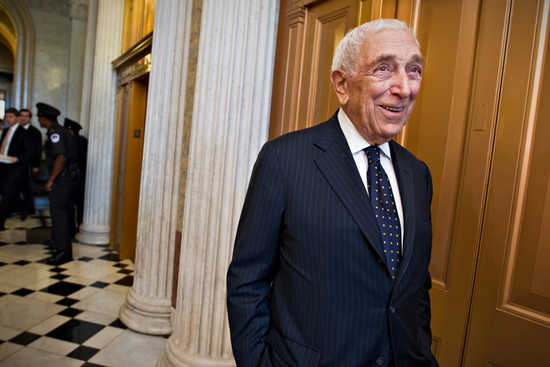Nation and Capitol Times editor/writer John Nichols eulogized Senate stalwart Frank Lautenberg (New Jersey_ when he passed away last month, by calling him bold, unapologetic, and a carrier of the New Deal Faith. Among other things, Lautenberg was the fire behind the 21st Century WPA Act, which aims to revive New Deal programs that put people back to work. Here’s a excerpt from his article, with a link below for the full text:
Frank Lautenberg, the son of a Paterson, N.J., silk mill worker and the last World War II veteran serving in the U.S. Senate, took his cues from another political time: a time when liberals were bold and unapologetic, a time when it was understood that government could and should do great things.
One of the few members of Congress who could remember listening to Franklin Delano Roosevelt on the radio and going to college on the initial GI Bill, Lautenberg served five terms in the Senate as a champion of great big infrastructure investments — especially for Amtrak and urban public transportation — great big environmental regulations, great big consumer protections, and great big investigations of wrongdoing by Wall Street.
It can fairly be said that the New Jersey senator, who died Monday at age 89, kept the New Deal flame lit in the Senate. Indeed, he was behind one of the last major pieces of legislation proposed to renew one of FDR’s greatest legacies: the Works Progress Administration, which provided public works employment for millions of Americans during the Great Depression of Lautenberg’s youth.
When he introduced his “21st Century WPA Act” two years ago, Lautenberg declared: “Our economy will not recover and our nation will not move forward until we put jobs first. Establishing a 21st Century Works Progress Administration would immediately put Americans to work rebuilding our nation and strengthening our communities. Across the country, we continue to benefit from projects completed under President Roosevelt’s WPA, which employed more than 3 million Americans during a time of great need. A 21st Century WPA would tackle our nation’s job crisis head-on and accelerate our economic recovery.”
A self-made millionaire who paid his own way into politics at age 58, Lautenberg never forgot that government programs lifted him out of poverty. And he refused to bend to the austerity fantasies of official Washington. Indeed, he attacked them with gusto, especially after returning to the Senate in 1983 following a bizarre turn of political events in the early years of George W. Bush’s presidency. …
Read more here.

I learned about the Works Progress Administration through a course in Environmental Management. I know that the administration was initially named the Civilian Conservation Corps, but I was wondering if anyone knows if the WPA exists under a different name or if it disbanded. Was it managed well? Was it sustainable?
Thank you.
The WPA and the CCC were actually two different programs. The CCC was established in 1933 and the WPA in 1935 (though it was preceded by the short term work of the CWA & FERA). The WPA ended in 1943, by which time it had changed the physical and cultural landscape of the U.S. Especially by the late 1930s, it faced opposition in Congress and its various projects received less funding. Its projects were proposed by state and local governments and administered locally, though the feds approved projects and paid the majority of the costs. But overall, the WPA put millions to work and improved infrastructure in nearly every town in the U.S.
(See our New Deal history pages for summaries of programs and a timeline — it can all get a bit confusing!)